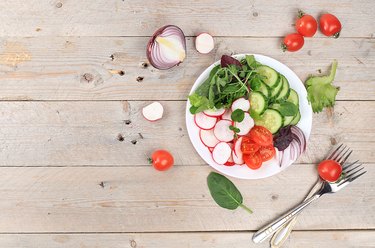
You might reach for salad as a healthy meal or side, but it may cause digestive problems depending on what's in it. Raw vegetables and fruits are foods that can cause bloating and gas thanks to certain compounds and bacteria, and they could be why you may have a bad stomachache after eating salad.
Read more: The 9 Worst Foods for Bloating
Video of the Day
Video of the Day
Fiber Gets You Going
Fiber is a carbohydrate that can't be digested by the body when eaten, according to Harvard T.H. Chan School of Public Health. But fiber has major benefits: It bulks up to slow the absorption of fats and cholesterol, or it plows gently through your intestines to clean and clear out your tubes. It's a key contributor to regular bowel movements.
There are two forms: soluble and insoluble, Harvard notes. Soluble fiber dissolves in water and can help lower blood sugar and cholesterol levels.
Soluble fiber foods include:
- Oatmeal.
- Nuts.
- Beans.
- Lentils.
- Apples.
- Blueberries.
Insoluble fiber doesn't dissolve in water and is beneficial in assisting food moving through the digestive system to prevent constipation.
Insoluble fiber foods include:
- Wheat.
- Brown rice.
- Legumes.
- Carrots.
- Cucumbers.
- Tomatoes.
"Salad vegetables contain indigestible cellulose, which is a type of insoluble fiber," says Boston-based Erin Kenney, RD, LDN, author of Rewire Your Gut and founder of Nutrition Rewired, "meaning that much of what's on your plate is indigestible."
So those salad veggies that help prevent constipation could also cause some gas and bloating. Although fiber is beneficial to your health, insoluble fiber is typically the culprit that causes the bloating and gas, according to the International Foundation for Functional Gastrointestinal Disorders. This can be especially true in individuals dealing with intestinal disorders, like irritable bowel syndrome (IBS).
"Not chewing vegetables completely, having low stomach acid (often seen with high stress) and irritable bowel syndrome are a few conditions that can make it difficult to digest certain vegetables," Kenney says.
The recommendation for fiber intake is 20 to 35 grams each day, the foundation says, and the guideline is to start low and go slow when adding it to your diet.
Select and prepare your fruits and vegetables safely when you're putting together a salad. The Centers for Disease Control and Prevention (CDC) states that germs on fresh produce are a cause of foodborne illnesses in the United States.
For instance, "Iceberg lettuce might be contaminated with a disease-causing bacteria, such as E. coli," says Kenney. "It's important to always thoroughly wash your produce, even if the package says it's been pre-washed." To prevent foodborne illnesses, the CDC also recommends you:
- Choose produce that isn't damaged or bruised.
- Keep pre-cut fruits and vegetables cold and refrigerate within 2 hours after cutting or cooking them.
- Separate fruits and vegetables from any raw meat, poultry and seafood.
If you have a bad stomachache after eating salad, food poisoning could potentially be the cause. The CDC describes food poisoning symptoms as:
- Nausea.
- Stomach cramps.
- Vomiting.
- Diarrhea.
If you chew well, keep your stress down and clean your veggies, you might have a better chance of avoiding that tummy discomfort. But beware of another potential threat, known as FODMAPs.
Swap Veggies High in FODMAPs
Many fruits and vegetables contain carbohydrates that are especially hard to absorb in your small intestine, creating gas and flaring up IBS symptoms, according to Harvard Health Publishing. These specific foods are called FODMAPs, which stands for fermentable oligosaccharides, disaccharides, monosaccharides and polyols.
"These short-chain carbohydrates resist digestion, and instead of being absorbed into your bloodstream, they make their way to the colon where they ferment and create gas," Kenney says. "They then pull water into the intestinal tract, which builds up, causing bloating, cramping, pain and diarrhea/constipation."
Common fruits and vegetables that are higher in FODMAPs, per Harvard Health, typically find their way into salads include:
- Apples.
- Mushrooms.
- Snow peas.
- Brussels sprouts.
- Broccoli.
- Onion.
- Cauliflower.
- Cherries.
- Blackberries.
When following a low-FODMAPs diet (limiting the amount of these carbohydrate foods), it's been shown to improve IBS symptoms in about 78 percent of patients, according to Harvard Health.
"If you suspect FODMAPs might be an issue for you, be sure to work with a registered dietitian to ensure you're getting adequate nutrition while resolving your gastrointestinal symptoms," Kenney says.
- Harvard T.H. Chan School of Public Health: “Fiber”
- Erin Kenney, MS, RD, LDN, HCP, dietitian, Boston; author, “Rewire Your Gut”; founder, Nutrition Rewired
- International Foundation for Functional Gastrointestinal Disorders: “Dietary Fiber”
- Centers for Disease Control and Prevention: “Fruit and Vegetable Safety”
- Centers for Disease Control and Prevention: “Foodborne Germs and Illnesses”
- Harvard Health Publishing: “Try a FODMAPs Diet to Manage Irritable Bowel Syndrome”
Is this an emergency? If you are experiencing serious medical symptoms, please see the National Library of Medicine’s list of signs you need emergency medical attention or call 911.